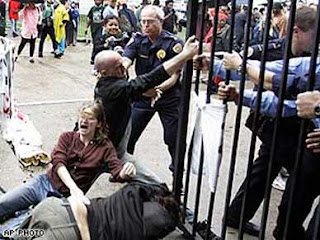Suffering and social injustice continue in New Orleans
 So what does it say about the United States when actor Brad Pitt has a better plan to address the post-Katrina housing crisis in New Orleans than either the president of the United States or any of the candidates (Democrat or Republican) running for office? With many people still living in formaldehyde-polluted trailers, the New Orleans city council is following through with its plans to demolish the city's four largest low-income housing developments.
So what does it say about the United States when actor Brad Pitt has a better plan to address the post-Katrina housing crisis in New Orleans than either the president of the United States or any of the candidates (Democrat or Republican) running for office? With many people still living in formaldehyde-polluted trailers, the New Orleans city council is following through with its plans to demolish the city's four largest low-income housing developments.Protesters, who understandably do not trust the promises of government officials, do not believe that the current units will be replaced with housing they can afford. In their view, the plan to transform New Orleans into a kind of sanitized "Dixeyland" tourist destination (devoid of "undesirable elements") continues to unfold. (GW)
Violent protests over housing erupt in New Orleans
CNN News
December 21, 2007
NEW ORLEANS, Louisiana (CNN) -- Protests against a City Council plan to tear down low-income New Orleans housing turned ugly Thursday, with police using pepper spray and stun guns to clear a crowd angry they weren't allowed into City Hall for the vote.
The City Council voted unanimously to greenlight the demolition of the city's four largest public housing developments, saying they are too damaged by Hurricane Katrina to allow residents back into them.
But many in New Orleans, including former residents of the developments, say they fear the local and federal governments will not guarantee similarly affordable housing be built in their place -- calling the demolition an effort to move poor people out of the city.
At about 11 a.m., several protesters were dragged out of council chambers after scuffles broke out among people who packed the room, and members of the crowd booed council members and shouted insults at them.
About 30 minutes later, hundreds more protesters angry that they weren't allowed into the meeting began rattling an iron gate outside City Hall.
"They were pulling the gate open, trying to come in," said Superintendent Warren J. Riley of the New Orleans Police Department. "They were allowed to stand there and protest peacefully. Then they began to try and tear the gate down. They punched a couple of civil sheriffs in the face. They broke the gate open. So, some of those officers did use Mace to defend themselves and also to regain control of the gate and close the gate."
Riley said that after the council chamber's maximum capacity of 278 was reached, no one else was allowed inside.
Video, shot by New Orleans television station WDSU, shows at least one law enforcement officer shooting a liquid spray at the crowd as police struggled with protesters for control of the gate.
Moments later, a woman could be seen crying and screaming on the ground before several other protesters picked her up and carried her away.
Peter O'Connell, who described himself as a student living in New Orleans, told the station he was hit by pepper spray and narrowly avoided being shocked by a police stun gun, which hit his jacket but not his body.
"We were just trying to gain access to the City Council meeting, which we all feel and know that we have a right to attend," he said. "We were denied access and, in the process, brutalized by the police."
Riley said the use of force was justified.
"It was clear that there were people there that had one goal in mind and that was to be disruptive, be disobedient and in some cases to actually start a physical confrontation," he said.
The department said 15 people were arrested. Most were charged with disturbing the peace, and all had been released from jail by Thursday evening, police said. Authorities said there were no serious injuries.
After the vote, New Orleans Mayor Ray Nagin commended the council for the decision.
"Could the federal government have done better? Sure. Could [federal housing officials] have opened more units quicker? Sure," he said. "But we are where we are today, and today, we had a unified decision to move forward with accountability, honoring our overriding premise that every citizen has a right to return to the city."
The city has promised to replace the developments with mixed-use family housing that will provide plenty of low-income units.
Some at Thursday's meeting said that saving the existing developments would not have been a favor to the city's poor.
Howard Robertson, a retired major with New Orleans police, said the units already were in bad shape before Katrina -- with many of them boarded up and vacant havens for crack dealers.
"Since the storm, they are even in worse condition -- windows are broken, more than a fourth of all the buildings are boarded up where you can't even go in," he said. "All the city's trying to do is actually improve the living conditions."

0 Comments:
Post a Comment
<< Home